
Satsvarupa dasa Goswami Maharaja
Spiritual Family CelebrationSaturday, July 5, 2025
What
Meeting of Disciples and friends of SDG
Where
The Veterans of Foreign Wars Hall
845 Hudson Avenue
Stuyvesant Falls, New York 12173There is plenty of parking near the Hall. The facility is just a few minutes’ walk from SDG’s home at 909 Albany Ave.
Schedule
10:00 – 10:30 A.M. Kirtana
10:30 – 11:15 A.M. Presentation by Satsvarupa Maharaja
11:15 – 12:30 P.M. Book Table
12:30 – 1:15 P.M. Arati and kirtana
1:15 — 2:15 P.M. Prasadam FeastContact
Baladeva Vidyabhusana at [email protected] or (518) 754-1108
Krsna dasi at [email protected] or (518) 822-7636SDG: “I request as many devotees as possible to attend so we can feel the family spirit strongly. I become very satisfied when we are all gathered together.”
******
Śrī Caitanya-caritāmṛta, Madhya-līlā 20.124–125: “O great learned devotee, although there are many faults in this material world, there is one good opportunity—the association with devotees. Such association brings about great happiness. . . . .”
Srila Prabhupāda: “Therefore, our Society is association. If we keep good association, then we don’t touch the darkness. What is the association? There is a song, sat-saṅga chāḍi’ kainu asate vilāsa, te-kāraṇe lāgila mora karma-bandha-phāṅsa (Gaurā Pahū, verse 3). Sat-saṅga. Sat-saṅga means association with the devotees. So the one poet, Vaiṣṇava poet, is regretting that, ‘I did not keep association with the devotees, and I wanted to enjoy life with the nondevotees. Therefore I’m being entangled in the fruitive activities.’ Karma bandha phāṅsa. Entanglement.” [Conversation with David Wynne, July 9, 1973, London]
Sorry for not writing for a while. This past month has been relatively uneventful. Some days were up and some were down. There are still one to two Excedrin headaches almost daily and about three migraines a week. The medicines still work to chase them away away once they come, but the new medication regime does not seem to be working yet as far as stopping them completely.
We tried reducing one migraine med, and had to go back up. Now we’re trying to administer it in far smaller doses throughout the day. Satsvarup Maharaj still continues to write extensively and remains cheerful with that. A chiropractor has been coming to the Ashram weekly, and that seems to help with arthritis pain. Old age is not pretty.
Baladeva
If you would like to help, please contact Kṛṣṇa-bhajana dāsa at [email protected] or [email protected] and we will find you a service that utilizes your talents.
When you chant within the protection of undisturbed bhajana, it is simply different than pacing the floor between meetings, hurriedly “finishing your rounds” with a mind blazing full of schemes and agitations.
******
Dear fellow chanters, you know better than I what you have to do. Just accept me as your friend, fellow sufferer and fellow rejoicer in the gift of harer nama.
I don’t know exactly what to do myself to cross over hurdles like pramada and lovelessness, so how can I presume to teach you? I have quoted many nectarean passages from Prabhupada and Vaisnava scriptures. The gurus and sastras are our guides.
******
I write this having just chanted for another hour and a half. It was empty, but not void. I was chanting the Hare Krsna mantra, but with the outer covering. Bhaktivinoda Thakura says that when we chant with this outer covering, we are not actually chanting the name. I regret my inability. I regret that I don’t break down and cry, “I don’t want this! I want real chanting, please!”
It was an hour and a half well-spent in terms of what else I could have done. Forty rounds a day is time well-spent, and three weeks at that rate is no waste. The more I see that I don’t chant well, the better it is that I keep on trying.
******
You can’t lose in chanting Hare Krsna. Even a miss is a gain. Even though I am only going through the motions, and sastra tells us that such mechanical chanting doesn’t attract Krsna, yet it is the best I can do right now. I offer it to Him with a sincere apology, and I continue making my offering.
******
Let me close this day by leaving this page and squeezing out a last extra-extra round. This is my primary service to you with which we begin and end our spiritual life.
“Forget the past that sleeps and ne’er the future dream at all . . . ” But now, chant Hare Krsna.
He told you to do it, he asked you,
he charmed you to,
he gave you the red beads,
he promised wonderful things would come if you would just be patient,
a revolution, Lord Caitanya’s mercy.
Finger them, think of him,
hear—
then it will come.
******
Hare Krsna, Hare Krsna. Chanting too fast? No, speed is okay, yet sometimes you think, “How can I recall and savor that Krsna attracts Radha and that Radha attracts Krsna, and They meet in various rendezvous in Vraja, if I’m saying Their names so fast?” But if I slow down, it doesn’t actually enhance lila meditation. Srila Prabhupada said, “One who cannot remember Krsna, let him always hear Hare Krsna, and then when he has perfected this art, then always he will remember Krsna, His activities, His qualities, etc.” (Letter to Sivananda, December 4, 1968).
******
Just as a sincere host and good friend says, “Come back again soon, and next time stay longer”—so my japa needs are telling me, “We’d love to have you again. Please come back. Next time will be even nicer.”
******
This is the “yea-saying” to devotional life. Yes, I will chant. Yes, I do chant. I am a Hare Krsna person, I like to chant all day whenever I can. I am not like Dracula when you show him the cross. For me, the offer to chant on my beads is always welcome. The retreat gave a refreshed sense of proof that this is so.
“While the body is fit, therefore, why should we not chant the holy name of the Lord loudly and distinctly? . . . One who chants the holy name of the Lord constantly is guaranteed to return home, back to Godhead without a doubt” (Bhag. 6.2.49, purport).
******
I want to really understand how important it is to beseech the mind to cooperate with our attempts to chant japa. In a sense, the mind is responsible for our japa. When the mind is under control, we can actually hear the holy names without being attentive to other “noises.” It requires the cooperation of the mind.
Of course, we also know that it is not just the “badness” of our minds, but the material world is filled with distraction. However, the mind has become so implicated in past activities and impressions that he has become part of the problem.
pp. 20-23
Missed my midnight reading. Had to wait for the headache to go down. It’s almost gone now, but I still don’t have the concentration and calm I need to read with attention. Feeling mentally feverish because I want to make up for lost time.
Blow a horn
for you not
me—for Krsna.
I said some guy looked phony, but maybe that’s who he is. Maybe he’s playing a role he really wants to play because he sees it as effective preaching. Well, I didn’t like his style, but what then of my own? Who am I? Am I the person who wears the sannyasa skirt? Do I want to wear sweatpants and a sweatshirt and wander around like Albert Einstein in a daze of writing and reading?
Madness mild
hid wild
the poor cat, the
poor helpless chicks
of the hen, our dog
ate ’em, or he would
at least kill as sport
in his instinctive romp.
“That’s the material world.”
The kids in Wicklow are excited
by the arrival of the llamas.
They came from England, missed
the ferry, then had to wait
twelve hours for the next one,
poor llamas.
Feelin’ better that I can
express in an
Italian expresso cappuccino
monks and long-haired girls
sixteen-year-olds in Levis
singing with guitar
poems of their 1960s
eternal youth and
dead old hippie poets
dying dying dead
now after
misusing the body
drug-wasted and lamenting
old fools.
It’s too late.
I took the safe path,
and eternal, seeking
ever
my Swami. Laugh, America,
have a good laugh
a good look at
the animal (thin) in the zoo,
his topknot and
wear-ever
wristwatch, his
funny look and tortured headache,
just go ahead and laugh.
Then throw your Popsicle sticks
at him—it’s his
feeding time.
Prose hose sock
Soren
word pose ain’t
solvin’ my dilemma.
Krsna Art Pose
Christ Have Sale
I don’t have to work for a
living, see, but I paid off the karma in
headaches.
This day I’ll read the
songs sung by Lord Siva and
maybe the Kumaras’
speech to Prthu—I
mean the original,
O speaker of the House.
I have limited energy and wanna know how to go through a book or hour in whatever time I’ve got. Hey, Mista Jive, I gotta see you. My unconscious tells me you is a good fella. Whaddya say?
Belch, gelch. Kierkegaard is hard going. Kumaras—pure,
high, transcendental teachings. (Smile when you say that.) Reporter: “Please tell the folks what you are talking about.” Yes.
Rare esteem achieved.
Wet-haired yogis came up in the
Ganges interplanetary river
system. Yogis like Durvasa are much
faster than jets.
Oh, but Prabhupada, those are just
Hindu myths (they
would say).
Amazing he convinced us all. In the 1960s spirit, we were
not obedient to what they taught in school. Darwin and Marx
and Freud and Henry Miller—all the gods collapse. We leapt
into the absurd, although we soon realized that it wasn’t
absurd at all. It was true.
All truth.
The way it is.
Writing this until the sky
is clear enough
to go out for a walk.
Sergeant Wilcox added his
measure to the beef account and
I just didn’t have enough energy
to paint with all it takes and
yesterday I got sick.
O Rexroth, dense with
allusion, I
listened to that sound
at John Young’s house not so
long ago. I’m not so
different except just I
added the one.
In the mail (hung on outside doorknob in rain), a Global Pri-ority letter from a disciple who says she and her husband and child are all back happily under the same roof. Sometimes Vaisnavas fight, but they should make up as Indra and Maharaja Prthu embraced under Lord Visnu’s gaze.
pp. 120-124
A new generation brahmacari sits before you, Srila Prabhupada, chanting japa. He’s so young. I think, “I’m senior.” What does that mean? Do I think it means that I should be given honor and privilege? It means I should do more. I should know more and give more. I should freely tell your pastimes to others and assure them of their relationship with you. I should speak from my own experience and encourage them about the power of reading your books. That’s what being senior means. It means taking responsibility.
The letter on your desk today is to Kesava dasa, January 1972. Big, strong Kesava, Karandhara’s brother. Karandhara was the captain of L.A., and Kesava was the captain of San Francisco. Those good old days. He requested initiation for many boys. “I have been receiving so many reports about how my disciples of the San Francisco temple cannot be surpassed in distributing my books. Sometimes they are selling as many as seventy KRSNA books daily.”
The beginning of the tidal wave of book distribution in America. By hook or by crook. How did they do it? Kesava used to say, “No secret. Just go out and try.” They were determined and enthusiastic.
“By distributing my books profusely, you are giving me great encouragement to translate. And you are all helping me to fulfill the order which my Guru Maharaja gave me. So I am so much grateful to you and I am sure Krsna will bless you a million times over for doing this work.”
That famous “million times” line—all ISKCON knew about it. “I hope you all my beloved disciples in San Francisco are in strong health and jolly mood.”
Prabhupada includes his upcoming itinerary in the P.S.—Jaipur, Bombay, Nairobi, Mayapur, Hong Kong, Sydney, Tokyo, Hawaii “and then return to U.S.”
Srila Prabhupada, as I sit here, a young brahmacari interrupted me. Said he’s been reading Narada-bhakti Sutra and likes it. He said he used to be Steve and now he’s Sudama Vipra dasa. I remained stern because he was interrupting me, but I said something. He wants me to look at some of his recent poetry. I agreed. Srila Prabhupada, I will definitely encourage him with words. That’s what you want, or what’s the use of being a senior disciple?
The day you came to America, you didn’t have any assistant! I could never do what you did. I complain of headaches, but you had two heart attacks on the way to America. In Boston the day you arrived, you felt helpless, but then remembered what was written in the First Canto. Krsna-katha will cleanse the heart of the Americans too.
I see the light from your desk lamp shining on your lap. Your left hand is touching the mattress. You have fine hands. The mattress is covered with clean white sheets. The bell is tolling eleven.
Srila Prabhupada, while seated in this room, you noticed and criticized Nitai dasa’s hatchet motion of pranams to you. You said that he was doing it without love or respect. From this room you walked into the servant’s quarters and found them sleeping. That was an earlier year. 1977 was different. You withdrew from us gradually until most of the day you lay quietly on your bed, not talking or communicating.
Today you are still with us. If I cannot understand it, that doesn’t mean it’s not true. I also don’t realize how Krsna is with the gopis in vipralambha, even after He left Vrndavana.
This morning, Srila Prabhupada, you saw the young Indian woman dancing extravagantly in front of your golden murti at mangala-arati. She was escorted out, but showed up again in the temple room. In both places she made many full dandavats before Your Divine Grace. Crazy woman?
If a disciple is pure and full of yearning, you can be with him. As Krsna can talk with us, so can His pure devotee. This is possible due to the internal energy, which can make the impossible possible.
Your finger is pointing out of the hole in your beadbag. Your gaze is fixed at a point on the table. You might be thinking of what to say next in a purport. Your body is tanned, your cloth saffron, brown eyes, light limbs, and you have great determination and powerful, grave realization. Your methods are expert. You cared. You saved souls. You left India and did the best work and got the most mercy from Lord Caitanya. Preaching is not material. Who can do it except the empowered servant?
I worship you and beg for a drop of your preaching sakti. I am embarrassed to even admit it. People might wonder, “Why is he asking that? How is he going to preach? That’s not his nature.” But something impels me to say it. Being near you and thinking of you, if one wants to please you, if one wants to catch Krsna’s attention, this is what you recommended. Srila Prabhupada, please never leave me for a moment.
pp. 41-46
We are guided by what the pure devotee says about Govardhana. Imagine wandering around Vraja only on hearsay. What was intended to be an auspicious event could turn into a disaster. You might decide to pick up a govardhana-sila on a whim, put Him in your pocket, and do puja. But who gave you permission? And how will you worship this best of all servants of Lord Hari?
“Of all the devotees, this Govardhana Hill is the best! O my friends, this hill supplies Krsna and Balarama as well as Their calves, cows and cowherd friends with all kinds of necessities . . . Being touched by the lotus feet of Krsna and Balarama, Govardhana Hill appears very jubilant.” (Bhag. 10.21.18)
This verse was spoken by the gopis, who are the most appreciative of Krsna and Krsna’s paraphernalia. These gopis see Govardhana as the platform for Sri Krsna’s ecstasies. Govardhana gives Its body for the Lord to dance upon and Its caves for His meetings with them. No other devotee of the Lord is able to serve the Lord so constantly. Therefore, the gopis call Govardhana hari-dasa-varya, “the best among the servants of the Lord.”
That we have little experience, wisdom, or devotion from which to draw becomes most obvious today while contemplating Govardhana Hill, with its jagged, right-angled rock outcrops. The sunshine reveals red, blue, and gray rocks, and the path is fourteen miles around—soft, earthy parikrama.
To feel small and unworthy at Govardhana is a good thing, but we shouldn’t feel crushed. Rise up from your prostrated obeisances and pray to the merciful Vaisnavas.
Due to separation from the Lord and His devotees, Govardhana is shrinking. Who can fail to see Govardhana except the blind or the killer of the soul? I am sitting here and only meditating on Govardhana. I see myself approach from a great distance. I express the words and feelings I have learned from my trust in Srila Prabhupada and the great devotees. I beg all of them for the mercy of Giriraja. One day, may I too attain a residence near Govardhana?
When I went to Govardhana last year, I sat and read from the prayers of the Six Gosvamis with my friends. Of course, we avoided any comments about geology or archaeology. We especially spoke without reference to mythology. We are no longer atheists. As we read, a small, humanlike skull stared at us from the side of the hill.
“O Govardhana! You affectionately and secretly embrace the neck of your own dear friend, Sri Radha-kunda; the place which is very dear to you and to Lord Hari. Please allow me to live close by you and show me the intimate pastimes of the youthful Divine Couple there.” (Sri Govardhana-vasa-prarthana-dasaka of Srila Raghunatha dasa Gosvami, verse 8)
“When the Lord saw Govardhana Hill, He immediately offered obeisances, falling down on the ground like a rod. He embraced one piece of rock from Govardhana Hill and became mad.” (Cc. Madhya 18.16)
Even as I write, I see and feel the presence of my brother, Bhurijana Prabhu, who took me there twice and who knows how to go on parikrama and worship Govardhana. I think of Mahanidhi Swami offering tulasi leaves to his govardhana-sila. I think of Sesa Prabhu in an apartment on Watseka Avenue, offering Govardhana a silver crown and a silver throne, and whose wife and two daughters come for darsana.
I can’t pretend to be filled with pure devotion when I recall the pastimes Radha and Krsna performed at Govardhana, but I agree to hear these lilas and to “merge” into them. It would be nice. One day I may leave behind all other concerns. I may live in Vraja and be able to touch Govardhana daily. I am waiting for more purification.
ISKCON devotees like me like to go to Govardhana. Like me, they can’t help but take their troubles with them. Vraja works on us. It brings out our faults and enables us to see more clearly how to rectify them. One friend arrived at Govardhana from the Caribbean. He was going through a divorce and was suffering from the trauma of it all. He was unable to sleep and had given up his temple duties. He fell ill. Fortunately, he had the good sense to come to Vrndavana for relief, especially Govardhana. It is natural that when a devotee like that goes on parikrama, he will think of his problems. He can’t help it. Often, though, there is a breakthrough, and the problem and its solution become clearer. While walking around Vrndavana, our hearts open and we realize how we need to grow. We know we will eventually have to return to the West and pick up the thread of our lives there, but while on Vraja parikrama, we can become inspired to face our lives for what they really are. My friend realized he should forgive his wife and return to his service, and he did.
pp. 51-56
COMPASSION IS A LOFTY IDEA. At our best, when we are driven by compassion we strive constantly to rescue others from the great mistake of bodily identification and help them become fixed in their spiritual identity where they can at last taste true happiness. Such an accomplishment takes incredible selflessness, untiring dedication, and a strong and secure personal understanding and practice of Krsna consciousness.
Often, however, in our attempt to reach the ideal, we bypass the very human expressions of kindness and consideration that are the qualities of a compassionate heart. Devotees have even been afraid that too many acts of kindness and consideration are signs of mundane compassion, and that we have lost our sense of the spiritual mission. In the Bhagavad-gita, Srila Prabhupada draws the distinction between mundane compassion and spiritual action quite clearly. The Bhagavad-gita states:
“When the son of Kunti, Arjuna, saw all these different grades of friends and relatives, he became overwhelmed with compassion and spoke thus. . . . My dear Krsna, seeing my friends and relatives present before me in such a fighting spirit, I feel the limbs of my body quivering and my mouth drying up.” (Bg. 1.27-28)
Srila Prabhupada writes,
Any man who has genuine devotion to the Lord has all the good qualities which are found in godly persons or in the demigods, whereas the nondevotee, however advanced he may be in material qualifications by education and culture, lacks in godly qualities. As such, Arjuna, just after seeing his kinsmen, friends and relatives on the battlefield, was at once overwhelmed by compassion for them who had so decided to fight amongst themselves. As far as his soldiers were concerned, he was sympathetic from the beginning, but he felt compassion even for the soldiers of the opposite party, foreseeing their imminent death. . . . —Bg. 1.28, purport’
Later, Prabhupada states that “such a kind and softhearted person, in the devotional service of the Lord, is fit to receive self-knowledge.” (Bg. 1.46, purport)
In the next chapter, however, Srila Prabhupada calls Arjuna’s compassion mundane. “Sanjaya said: Seeing Arjuna full of compassion, his mind depressed, his eyes full of tears, Madhusudana, Krsna, spoke the following words.” (Bg. 2.1)
From the purport:
Material compassion, lamentation and tears are all signs of ignorance of the real self…… No one knows where compassion should be applied. Compassion for the dress of a drowning man is senseless. A man fallen in the ocean of nescience cannot be saved simply by rescuing his outward dress—the gross material body. One who does not know this and laments for the outward dress is called a sudra, or one who laments unnecessarily. Arjuna was a ksatriya, and this conduct was not expected from him….
Over the years, these types of comments have led devotees to examine carefully whether they are acting out of spiritual realization or a sense of mundane compassion. If Arjuna, seeing his relatives and teachers lined up before him on the battlefield, was judged to have mundane compassion and therefore corrected by Krsna with stern words, what about our own feelings toward others and our own attempts to simply be kind? Sometimes we have so carefully examined our motives and tried to come out acting on the spiritual plane that we have acted beyond our realization and given up common courtesy. How many of us have felt that our needs or desires are more important than the needs or desires of others simply because we are devotees? How many of us have even felt that in relation to other devotees?
We call a lecturer compassionate for speaking only forty minutes. After all, he could have spoken for three hours. We laugh at that because we have been taught to think of a lofty ideal. Maharaja Pariksit, for example, sat hearing Bhagavatam for seven days. During that time, he neither ate, drank, nor slept—so great was his taste for hearing krsna-katha. Yet we can barely sit for an hour. Some people blame that on themselves, others blame it on the quality of the speaker, but whatever the reason, it is obvious that we are neither Maharaja Pariksit nor Sukadeva Gosvami.
I can think of a half-joke to illustrate this point. When I was at a devotee’s house in Trinidad some time ago, I saw a button that said, “Do someone a favor today: mind your own business.” The more I thought about it, the more I realized that not meddling in someone else’s life is a form of compassion. If we can avoid judging others by our own standards, and more importantly, avoid trying to manipulate them into doing what we want them to do—even in the name of caring for them—then that is compassion. It takes humility not to be intrusive. Humility, along with kindness and courtesy, is a quality that helps us develop true compassion. Someone who minds their own business may sometimes appear indifferent, which is the opposite of compassionate, but it’s actually a kindness to allow people to live their own lives, to develop their own relationships with Krsna, and to pursue their own service offerings. If we are humble and respectful toward others in that sense, we will also be in a better position to actually help others, should they need our help.
pp. 45-48
Lunch: our first cooked food in three days. They cut vegetables, and M. put them on the flame. A green vegetable in slices with two capātīs and a few pieces of tomato and papaya. It tasted good because we were so hungry. We realized that we didn’t need so much seasoning or exotically cooked desserts when we are hungry.
******
I doze off many times a day here, but last night I couldn’t fall asleep. I was asking myself over and over, “Where is my deeper truth, my deeper, total reality?”
******
M. will be here in twenty minutes and someone else will probably knock on the door sooner than that. I’m going to try to write anyway.
The doctor is friendly enough, and humble. He is the whole life and authority of this place. “Who is your teacher?” I asked. He said he went to school for five and a half years, and I understood that he was different than Dr. Sarma, who learned nature cure from his family. He says he’s been the doctor here for ten years and that he serves the patients all day. He says he allows only six at a time and tries his best to please them with his limited Indian means. He has a staff of about a dozen.
Then he told me we would be doing more advanced yoga āsanas at 5 P.M. Okay.
Earlier today I noticed I was more relaxed, not physically anxious. I’m often worried on the superficial level about what will happen, but it may be that the light diet makes me weaker and somehow more ready to face whatever is coming. That’s a gain I’d like to keep. I still jump when someone knocks on my door, but I don’t have to be a “nervous wreck.”
I hope to find methods to cope with the headaches and to reduce the pain. We are already planning to follow a simpler diet even when I’m traveling. When I can control it, when disciples cook, I just have to lay down the law: no big dessert and no heavy grains.
It’s odd how I have returned to nature cure after thinking I never would. I thought I had discovered major flaws in it when I listened to the arguments of an Āyurvedic practitioner. Now the disagreement seems theoretical. This place is moderate, too. It seems natural to return to the five great elements for health treatment—sun, air, water, fire, earth.
I’ll stick it out while I’m here and wait for the mercy of Kṛṣṇa conscious revelation. Japa is all mine from 2–4 a.m. That is my main concentration here. I don’t have so much time for writing.
Beep-beep of an Indian horn. Do I have to put up with the ladies yakking every day at noon rest time? Should I report it to the doctor? They could just as easily sit under the window of another cottage or under a tree.
Me, yours truly
honks on his horn
wants to give main place
to Kṛṣṇa—to please Kṛṣṇa
by all my acts.
Prabhupāda directs us,
“Here, massage me,
here, print and edit or
distribute books. There are so many
services. Take your pick.”
I pick writer, literary
writer, not goof-off.
I want to go back to Godhead
with serious devotees,
but I’ll have to give up more
bad habits to which I am still attached.
Gremlins, be gone.
Don’t write a whole book
complaining, “I can’t write
free. I doubt myself
and my location.”
Or am I meant to do that,
to dig at myself?
Who the hell am I?
Picasso says
the painter’s life is what
counts and I agree—Cézanne’s anxiety
and not his beautifully painted apples,
van Gogh’s torments.
The rest is sham.
Read the introduction to Summer Marathon, a traveler’s story. Maybe I was a little roundabout in parts of it.
I’ll phone M. at “two-nought-two” and start the official day. They ring your telephone at 6 A.M. as an alarm clock, by 6:15 you get a warm lemon drink, then M. and I walk back and forth on the grounds, chanting until 7:15, then gather with the others for morning exercises. Sound like fun? No? Please come along and tell us about Kṛṣṇa.
Mud pack over whole body, standing outdoors like a Śiva worshiper. Sun went behind cloud. Had to stand there for half an hour. Cleaning lady comes while I’m massaging Prabhupāda. I just keep working and don’t bother much about her.
pp. 189-94
Hope to make it. Why not?
Tensions?
You’ll be asking yourself
God the generic
the unique
a book,
Tell Me About God
soft, I think it was
with arguments by design
for one-year-old
children
me and momma
Tell Me About Jesus.
He was good.
Wait tell me more
– I’m amused –
how you learn
about God.
Did it stick? Was
it Madhvacarya
or Ramanuja or
Paul Tillich?
It was the parish
priest the community
college Marxist
it was the stylish
atheism of my
rebel act
it was Eastern
mystical coming
back
you heard my story
Wailing crying don’t
forget me and drop me
chanting God’s names
is not
counting change
not dialing the phone
or all those acts
could be
praying to Him
you can find your day
that way.
The tensions in you
got to come out some
how. Yeah I know!
God is Krishna is Krishna
crash it for now.
******
Pow Pow
8×4
Pow pow
Greeny don’t have fear streets are only
in dreams now
Eek mice don’t
ever enter our
house. Never saw
once whiskers or
feet or whisking –
only spiders –
people too rarely.
But what? I
don’t know – that way I
can’t let go, keeps me
awake at night –
the Catholic Mafia, the
US Army or Navy,
homeless, no job,
Godbrothers unfriendly
childhood chum bullies,
Get out and preach –
your spiritual master growing in
distance?
Now I’ve got to move
to him again. I
can’t you just paint
now. Pow – Greeny’s gonna go
inside and paint
8×4
splash.
******
(No doubt it’s getting darker earlier in the morning)
Ah am mem the Irish
why don’t you go to the U.S.
and spread joy
stamp out all enemies of
the Lord your boots are
so big and you’re so forceful
I think you could
journey, get into a taxi
and pay the fare and tip
get off at memory
lane. Oh yeah
Krishna slash to pieces
I will write new no
more just singing
what a devotee is
supposed to say
oh well you needn’t
I wanted to tell people but
I shrunk up with no message
at all.
This here purport friends,
written around 1973
uh…reveals the acarya’s
intentions and Prabhupada and Krishna
shall raise her hand:
“But what happened?
Why don’t you tell us
– you were there.”
I was but I forget
wuz a bear dear
Saranagati resident,
how are you in black
bears and your garden?
So I didn’t know but
you did.
Hare Krishna mantra was
sounded by me in Wicklow
and no one heard the
sheep so sad
be yourself anyway.
******
Oh boy live poetry
crafted to the touch
with an exciting climax and you
can half understand it breasts
and thigh or marble venous
compared with a live girl,
and the sculptor loved
them both. The poetess
visited the place in Austria.
I don’t get it, don’t like it.
Want my story, Austria a bad place,
ISKCON needs reform too,
and sculpture means Jagannatha
and Radha-Krishna.
I’m in the picture all rain-
studded jacket and pants,
stay in Ireland while you
can and make your poem clear.
pp. 35-40
As a drunkard I entered the crowded restaurant, stood on a chair and projected my voice: “Ladies and gentlemen! It is my mission, my message, to read to you something I wrote. Please don’t try to stop me.” A friend stood beside me with a machine gun pointed at whoever might try to break away. I read:
Four score and seven—start
again. I am a devotee
of Krishna, we all are, and we
need to surrender to Him.
In the past, too many thought
they had attained that already
but I say we must go deeper
in self-honesty and
ask ourselves, What do
I actually believe? We
will cling to the lotus
feet of our spiritual master
despite doubts—and that is
the paradox. He will
save us and we will
help the future doubters.
I then got down from the chair, a bit shakily since I have a bad ankle and ain’t like I used to be, and me and my friend ran the hell out of there and by a mystic siddhi we disappeared into thin air.
Sudden cry of a crow. Sounds like a person, startled me. Possessed by beings. Get rid of them by sincere prayer to Krishna. We are not supposed to ever blame Him for our sufferings. A devotee I know has had extreme suffering, and attempted remedies were worse than the disease. She finally broke down crying and blaming Krishna, “He could change this in a minute. He’s all powerful. Why does He let me suffer?” She said she failed the test by that breakdown. But I think she passed. It was just a weak moment, and even then she believed in His existence and His all-powerful nature, but just didn’t like the way He was treating her.
It’s the same kind of ride you take on the merry-go-round. The glockenspiel is playing but it’s such a limited tune, even less variety than the ice cream truck.
It insists get off here
and meet your brother in
the dark forest and
tell him about Krishna.
Don’t you know how to do it?
So many foolish old memories.
That guy may be wanting to hurt me—
I avoided him. My guardian angel protected
me from killing or
ruining myself although
I did get pretty much
contaminated and twisted.
All can have a good laugh
at me.
I asked the priest.
He asked me. Said he
would pray for me,
the village agnostic.
I’d received a good
dose of it in community
college—there is no
God. Everything is happening
by chance. Marx, Freud.
History teacher said, “Just remember
Stalin killed people
unless they changed their politics.
That’s a lot better than Hitler
who killed them just because
they were Jews.”
And Dr. A. laughed
along with Voltaire against
the theists and said, “There is
too much suffering in this
world for us to
consider a kind God
is in control.”
So what could I do?
Went to Confession and told
Father Hicks I no longer
believed in Confession itself.
He probably never heard
anything like that
in the dark confessional booth.
I went to see him.
I’ve told you this before.
I have a limited stock
of tales.
But in Krishna consciousness we
wandered all over the U.S.A.,
thousands of miles
crisscrossing west to
east, south to north,
stopping at the colleges,
and catching Srila Prabhupada,
especially in Los Angeles
and at his annual Mayapur
festival. He insisted
that he wanted us to gather and
we did.
Salad halcyon days.
Gung-ho, we will all become
pure and we are better
than all the karmis.
Just follow the ISKCON leaders
and distribute books.
Pay for the buildings.
Prabhupada approves. Go see
him and speak
and Krishna and Radharani on
the altar.
The old man’s face gets thinner, wizened. He blazes with some light within, but the outer covering is peeling off, getting more laughable, certainly no romantic hero. Under certain conditions in a certain society, he’d be respected and protected… But he has to wait in lines like anyone else. Get shoved around. So he stays away from this.
No, I don’t get shoved around. But that may happen too. Krishna is protecting you. But if you went to the human “soul” for more defeat, you’d learn more. You stay in your house saying, “I’ve had enough rough handling. I still dream about my mere two years’ active service in the Navy. And all those years of being a schoolboy hankering after sex. And even those years competing for the guru’s attention and tense, stressful zonal Gurupada trying to survive in times of change-up at the airport and rise of anticult in America. Gosh oh gee and getting squeezed at the GBC meetings. You couldn’t understand—Is this what Srila Prabhupada wants? Should I keep trying to be like Ramesvara? Can I be myself? Do I have a self? Oh, don’t let it come out of the closet. He likes to write poetry and be alone and even . . . yes even read about Christian or Eastern saints.
Now I’m in the permissive time, and this too has been given by His Divine Grace. Am I pleasing him by taking it? Is he saying, “Yes, go and take it and serve me as you did with your motor home. Work hard at your endeavors, chanting and writing and reading a little”?
Please don’t intrude now, not
just now
I have to create
while heat cracks into this room
I have to learn to create
the original cry
in a way I never did before.
Nancy Drew, the nurse-detective, entered the swamp at night and saved the children from the grips of the witch-hunters. Don’t be scared. God is here in our heart. Hare Krishna.
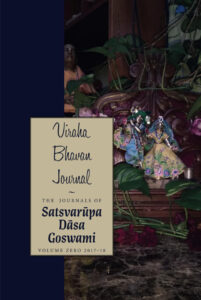
Viraha Bhavan Journal (2017–2018) was written by Satsvarūpa Mahārāja following a brief hiatus in writing activity, and was originally intended to be volume 1 in a series of published journals. However, following its completion and publication, Mahārāja again stopped writing books, subsequently focusing only on what became his current online journal, which began in August of 2018.
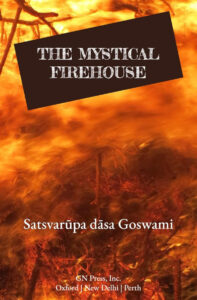
At first, I took it hard that I would have to live surrounded by the firemen, and without my own solitude. After all, for decades I had lived in my own house with my own books and my own friends. I was also now a crippled person who couldn’t walk, living among men who did active duties. But when Baladeva explained it to me, how it was not so bad living continually with other firemen and living in the firehouse with its limited facilities, I came to partially accept it and to accept the other men. I came to accept my new situation. I would live continually in the firehouse and mostly not go outside. I would not lead such a solitary life but associate with the other firemen.
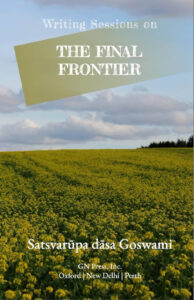
Let me write sweet prose.
Let me write not for my own benefit
but for the pleasure of Their Lordships.
Let me please Kṛṣṇa,
that’s my only wish.
May Kṛṣṇa be pleased with me,
that’s my only hope and desire.
May Kṛṣṇa give me His blessings:
Kṛṣṇa Kṛṣṇa Kṛṣṇa Kṛṣṇa Kṛṣṇa he
Rāma Rāghava Rāma Rāghava
Rāma Rāghava rakṣa mām.
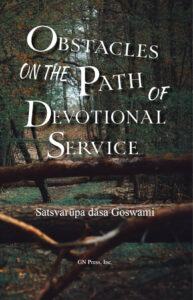
You mentioned that your pathway has become filled with stumbling blocks, but there are no stumbling blocks. I can kick out all those stumbling blocks immediately, provided you accept my guidance. With one stroke of my kick, I can kick out all stumbling blocks. —Letter by Śrīla Prabhupāda, December 9, 1972.
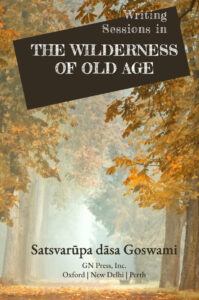
The Writing Sessions are my heart and soul. I’m trying my best to keep up with them. I am working with a few devotees, and they are far ahead of me. I wander in the wilderness of old age. I make my Writing Sessions as best I can. Every day I try to come up with a new subject. Today I am thinking of my parents. But I don’t think of them deeply. They are long gone from my life. Śrīla Prabhupāda wrote a poem when he was a sannyāsī, and he said now all my friends and relatives are gone. They are just a list of names now. I am like that too. I am a sannyāsī with a few friends. I love the books of Śrīla Prabhupāda. I try to keep up with them. I read as much as I can and then listen to his bhajanas.
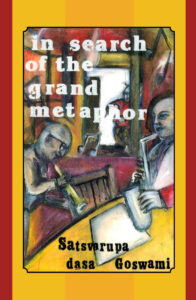
The metaphor is song. Explain it. Yes, particulars may not seem interesting or profound to readers who want structured books.
Wait a minute. Don’t pander to readers or concepts of Art. But Kṛṣṇa conscious criteria are important and must be followed. So, if your little splayed-out life-thoughts are all Kṛṣṇa conscious, then it’s no problem.
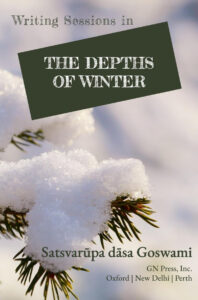
I am near the end of my days. But I do like the company of like-minded souls, especially those who are Kṛṣṇa conscious. Yes! I am prone to Kṛṣṇa consciousness. I have been a disciple of Bhaktivedanta Swami Prabhupāda for maybe almost sixty years. Sometimes I fail him. But I always bounce back and fall at his feet. It is a terrible thing that I sometimes do not have the highest love for him. It is a terrible thing. Actually, however, I never fall away from him. He always comes and catches me and brings me back to his loving arms.

This edition of Satsvarūpa dāsa Goswami’s 1996 timed book, Upstate: Room to Write, is published as part of a legacy project to restore Satsvarūpa Mahārāja’s writings to ‘in print’ status and make them globally available for current and future readers.
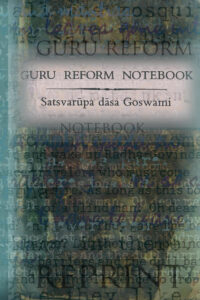
A factual record of the reform and change in ISKCON guru system of mid ’80s.
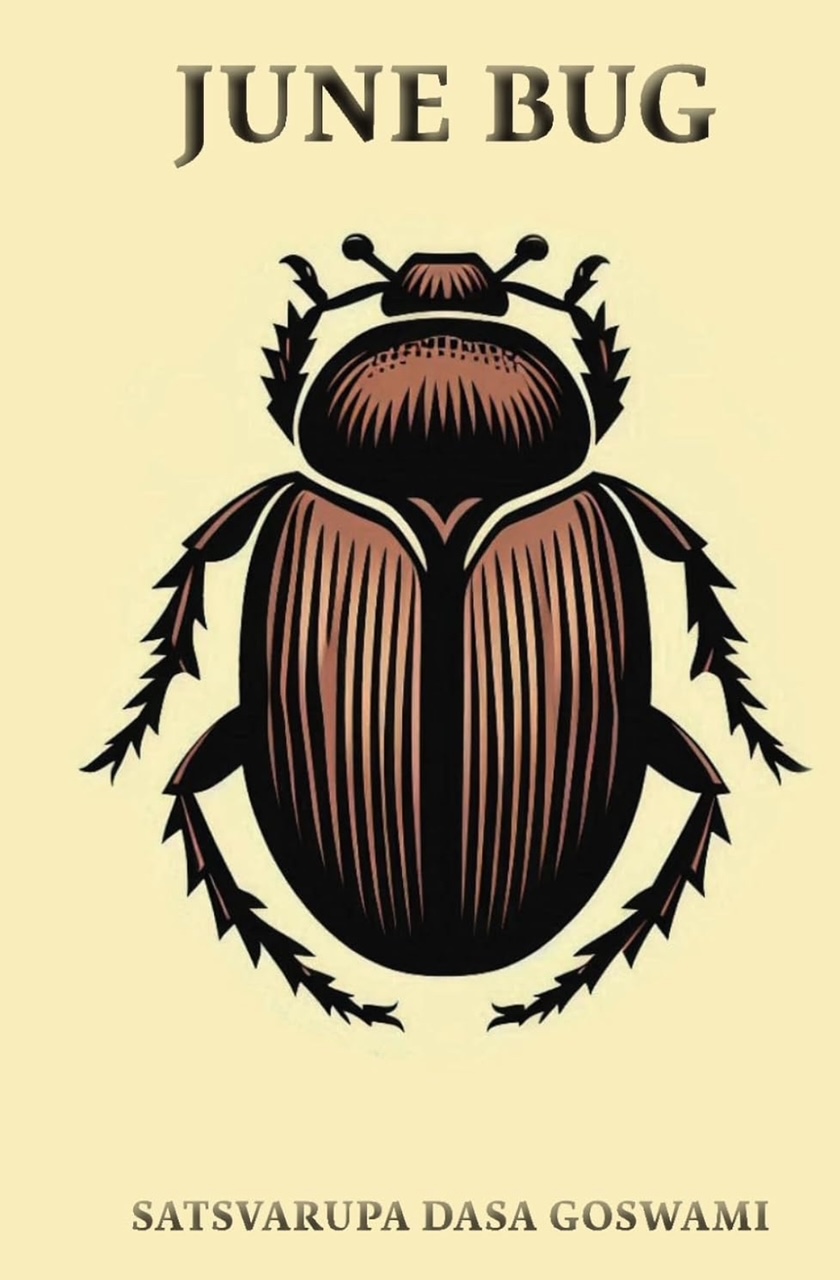
Readers will find, in the Appendix of this book, scans of a cover letter written by Satsvarūpa Mahārāja to the GN Press typist at the time, along with some of the original handwritten pages of June Bug. Together, these help to illustrate the process used by Mahārāja when writing his books during this period. These were timed books, in the sense that a distinct time period was allotted for the writing, during SDG’s travels as a visiting sannyāsī
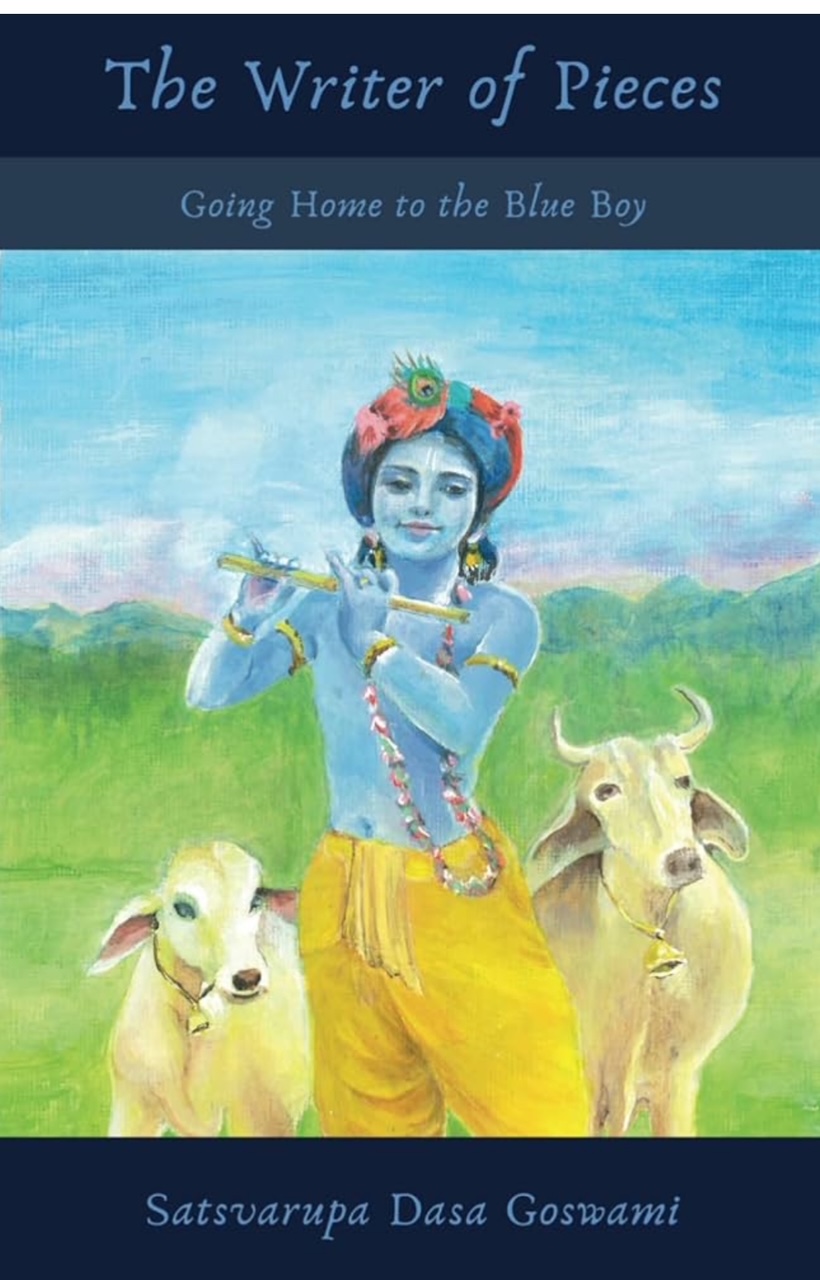
Don’t take my pieces away from me. I need them dearly. My pieces are my prayers to Kṛṣṇa. He wants me to have them, this is my way to love Him. Never take my pieces away.
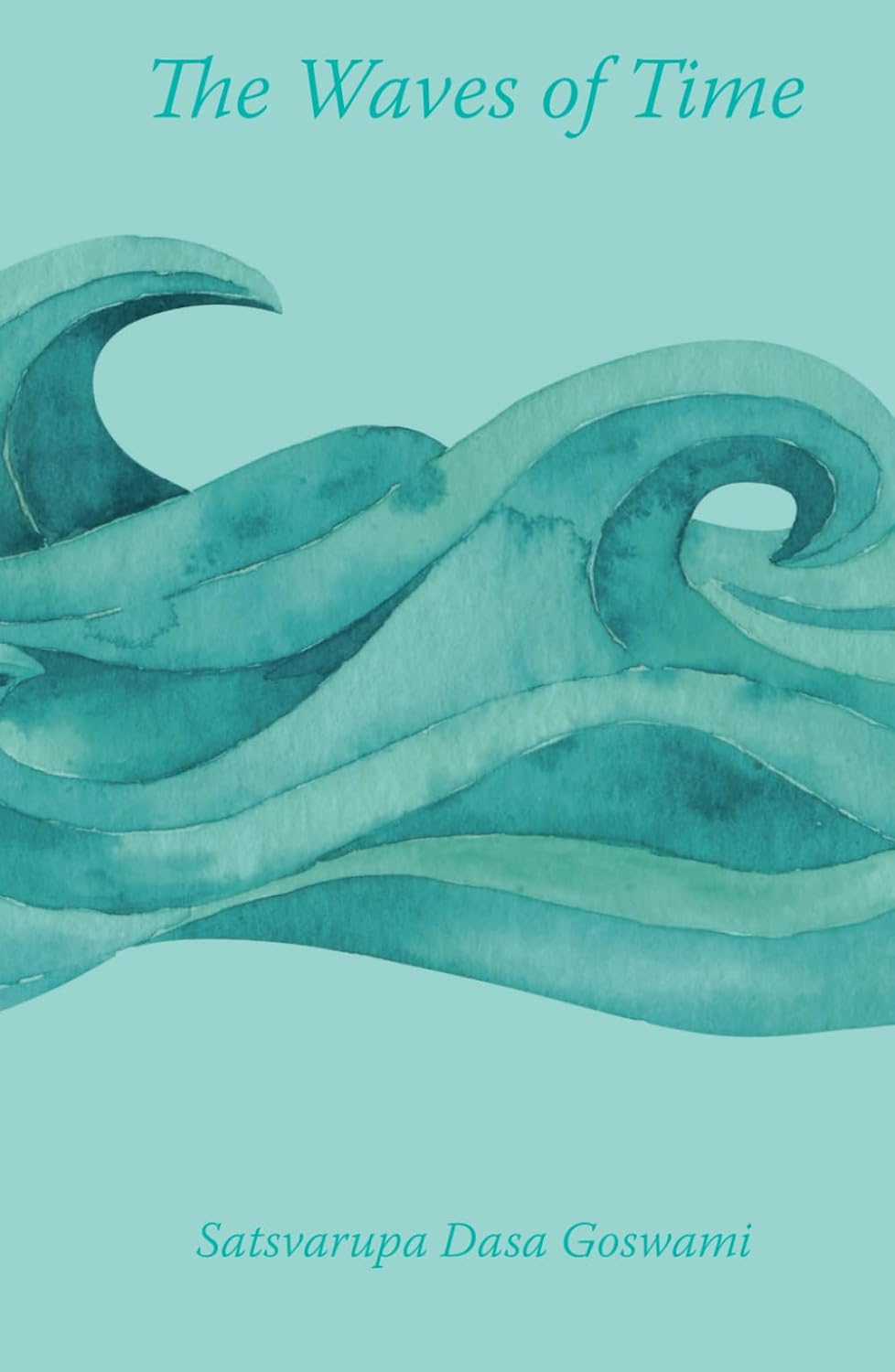
Many planks and sticks, unable to stay together, are carried away by the force of a river’s waves. Similarly, although we are intimately related with friends and family members, we are unable to stay together because of our varied past deeds and the waves of time.

To Śrīla Prabhupāda, who encouraged his devotees (including me) To write articles and books about Kṛṣṇa Consciousness.
I wrote him personally and asked if it was alright for his disciples to write books, Since he, our spiritual master, was already doing that. He wrote back and said that it was certainly alright For us to produce books.

I have a personal story to tell. It is a about a time (January–July 1974) I spent as a personal servant and secretary of my spiritual master, His Divine Grace A.C. Bhaktivedanta Swami Prabhupäda, founder-äcärya of the International Society for Krishna Consciousness. Although I have written extensively about Çréla Prabhupäda, I’ve hesitated to give this account, for fear it would expose me as a poor disciple. But now I’m going ahead, confident that the truth will purify both my readers and myself.

First published by The Gītā-nāgarī Press/GN Press in serialized form in the magazine Among Friends between 1996 and 2001, Best Use of a Bad Bargain is collected here for the first time in this new edition. This volume also contains essays written by Satsvarūpa dāsa Goswami for the occasional periodical, Hope This Meets You in Good Health, between 1994 and 2002, published by the ISKCON Health and Welfare Ministry.

This book has two purposes: to arouse our transcendental feelings of separation from a great personality, Śrīla Prabhupāda, and to encourage all sincere seekers of the Absolute Truth to go forward like an army under the banner of His Divine Grace A.C. Bhaktivedanta Swami Prabhupāda and the Kṛṣṇa consciousness movement.

A single volume collection of the Nimai novels.

Śrīla Prabhupāda was in the disciplic succession from the Brahmā-Mādhva-Gauḍīya sampradāya, the Vaiṣṇavas who advocate pure devotion to God and who understand Kṛṣṇa as the Supreme Personality of Godhead. He always described himself as simply a messenger who carried the paramparā teachings of his spiritual master and Lord Kṛṣṇa.

Dear Srila Prabhupada,
Please accept this or it’s worse than useless.
You have given me spiritual life
and so my time is yours.
You want me to be happy in Krishna consciousness
You want me to spread Krishna consciousness,

This collection of Satsvarūpa dāsa Goswami’s writings is comprised of essays that were originally published in Back to Godhead magazine between 1966 and 1978, and compiled in 1979 by Gita Nagari Press as the volume A Handbook for Kṛṣṇa Consciousness.

This second volume of Satsvarūpa dāsa Goswami’s Back to Godhead essays encompasses the last 11 years of his 20-year tenure as Editor-in-Chief of Back to Godhead magazine. The essays in this book consist mostly of SDG’s ‘Notes from the Editor’ column, which was typically featured towards the end of each issue starting in 1978 and running until Mahārāja retired from his duties as editor in 1989.

This collection of Satsvarupa dasa Goswami’s writings is comprised of essays that were originally published in Back to Godhead magazine between 1991 and 2002, picking up where Volume 2 leaves off. The volume is supplemented by essays about devotional service from issues of Satsvarupa dasa Goswami’s magazine, Among Friends, published in the 1990s.

“This is a different kind of book, written in my old age, observing Kṛṣṇa consciousness and assessing myself. I believe it fits under the category of ‘Literature in pursuance of the Vedic version.’ It is autobiography, from a Western-raised man, who has been transformed into a devotee of Kṛṣṇa by Śrīla Prabhupāda.”
 The Best I Could Do
The Best I Could DoI want to study this evolution of my art, my writing. I want to see what changed from the book In Search of the Grand Metaphor to the next book, The Last Days of the Year.
 a Hare Krishna Man
a Hare Krishna ManIt’s world enlightenment day
And devotees are giving out books
By milk of kindness, read one page
And your life can become perfect.
 Calling Out to Srila Prabhupada: Poems and Prayers
Calling Out to Srila Prabhupada: Poems and PrayersO Prabhupāda, whose purports are wonderfully clear, having been gathered from what was taught by the previous ācāryas and made all new; O Prabhupāda, who is always sober to expose the material illusion and blissful in knowledge of Kṛṣṇa, may we carefully read your Bhaktivedanta purports.

I use free-writing in my devotional service as part of my sādhana. It is a way for me to enter those realms of myself where only honesty matters; free-writing enables me to reach deeper levels of realization by my repeated attempt to “tell the truth quickly.” Free-writing takes me past polished prose. It takes me past literary effect. It takes me past the need to present something and allows me to just get down and say it. From the viewpoint of a writer, this dropping of all pretense is desirable.
 Geaglum Free Write
Geaglum Free WriteThis edition of Satsvarūpa dāsa Goswami’s 1996 timed book, Geaglum Free Write Diary, is published as part of a legacy project to restore Satsvarūpa Mahārāja’s writings to ‘in print’ status and make them globally available for current and future readers.